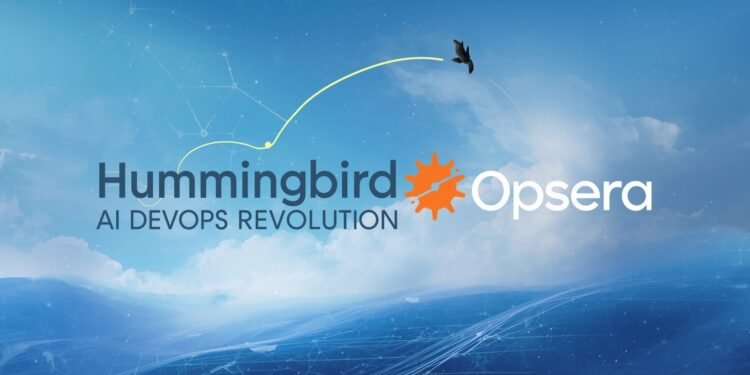The future of DevOps isn’t just automated — it’s intelligent. With the launch of its next-generation AI-powered DevOps platform, Opsera is raising the bar for what enterprise software delivery can look like in 2025 and beyond.
This isn’t just another “smart tool.” Opsera’s platform brings together cutting-edge innovations like Hummingbird AI reasoning agents, a plug-and-play analytics engine called “Insights in a Box,” and seamless integration with GitHub’s Model Context Protocol (MCP) — creating a fully context-aware, feedback-optimized pipeline that learns, adapts, and delivers better code at scale.
Let’s unpack what makes this launch so powerful, and why it could fundamentally change how DevOps teams operate.
The Problem: DevOps Is Drowning in Tools, Not Insights
Modern DevOps teams juggle dozens of tools — from CI/CD orchestrators and observability stacks to testing, security, and compliance platforms. But more tools haven’t made teams faster. They’ve made context-switching worse, data siloing deeper, and decision-making slower.
Developers are overloaded with alerts they can’t prioritize. SREs waste time piecing together logs, pipelines, and postmortems. And leaders often fly blind when trying to optimize for velocity, quality, and cost.
Enter Opsera’s new platform — designed not just to automate tasks, but to reason through them.
Hummingbird AI: Context-Aware Reasoning Agents
At the core of Opsera’s breakthrough is Hummingbird AI — a swarm of intelligent agents trained to understand how software delivery pipelines behave under real-world conditions.
These aren’t just generic LLMs responding to prompts. Hummingbird agents are purpose-built to:
-
Analyze historical delivery data
-
Correlate metrics from code, CI/CD, security scans, and runtime logs
-
Suggest proactive pipeline optimizations
-
Trigger automations based on reasoning, not rules
For example:
-
If build times spike after a new package update, Hummingbird flags it and proposes a caching fix
-
If deployment velocity drops after enabling SAST, it balances performance vs. security by recommending runtime validation
This is DevOps augmented with judgment, not just automation.
Insights in a Box: From Raw Logs to Executive Clarity
Data-rich doesn’t mean insight-rich — and most platforms still require teams to manually wire dashboards, correlate logs, and explain anomalies to leadership.
Opsera’s “Insights in a Box” feature eliminates that pain with plug-and-play analytics across:
-
DORA metrics (lead time, deployment frequency, change failure rate)
-
Pipeline bottlenecks and automation gaps
-
Security posture across the SDLC
-
Toolchain performance and license cost insights
Even better: these insights aren’t static. They evolve using AI models trained on your organization’s delivery history and industry benchmarks — giving context-aware recommendations instead of just red/yellow/green graphs.
Want to know why deployment velocity dipped last sprint? Or how much tech debt is hiding in your backlog? Ask Insights in a Box — it answers in real-time.
GitHub MCP Integration: Injecting Intelligence Into Every Commit
One of the most exciting parts of Opsera’s new platform is its integration with GitHub’s Model Context Protocol (MCP).
MCP lets AI systems exchange fine-grained metadata about code, contributors, intent, and environment — all attached directly to commits, PRs, or workflow events.
Opsera leverages MCP to:
-
Enrich code-level insights with historical team context
-
Optimize workflows per team or repo based on past outcomes
-
Alert developers before they introduce friction (e.g., test debt, security drag, branching issues)
Imagine pushing code and immediately being guided by an AI agent that knows:
-
The module’s risk profile
-
How similar changes performed in the past
-
What test coverage or rollback strategy is needed
It’s like pair programming with a DevOps-savvy AI — and it’s natively baked into GitHub via MCP.
Putting It All Together: Autonomous DevOps-as-a-Brain
What Opsera has built isn’t just a smarter dashboard or another monitoring overlay. It’s a DevOps brain — one that listens, reasons, learns, and adapts at every layer of the delivery stack.
This includes:
-
Orchestration: Triggering workflows across CI/CD, cloud infra, and security
-
Observability: Understanding logs, traces, metrics, and context
-
Feedback: Learning from past failures, triage, incidents, and rollbacks
-
Optimization: Continuously improving pipeline efficiency, stability, and compliance
All without needing a team of platform engineers to hard-code rules or chase integrations.
Who Is This For?
Opsera’s next-gen platform is ideal for:
-
Large enterprises with complex toolchains and compliance needs
-
Mid-size dev teams looking to unify fragmented delivery and security
-
SaaS companies chasing velocity without sacrificing reliability
-
CISOs and DevOps leaders who want real answers, not just dashboards
And because the platform is modular, you can deploy just the features you need — from AI-based pipeline analysis to GitHub MCP overlays — without a full rip-and-replace migration.
Final Thoughts: DevOps Gets Its Brain
Opsera’s new platform signals a turning point in the DevOps movement. We’re no longer stitching together scripts and dashboards hoping for velocity. We’re entering an era where AI doesn’t just automate the pipeline — it understands it, reasons about it, and improves it over time.
In the race to ship better, safer code faster, the teams who succeed will be the ones who listen to their pipelines — and let AI guide the way.
With Hummingbird AI, Insights in a Box, and GitHub MCP at its core, Opsera might have just delivered the most intelligent DevOps platform of the year.

















